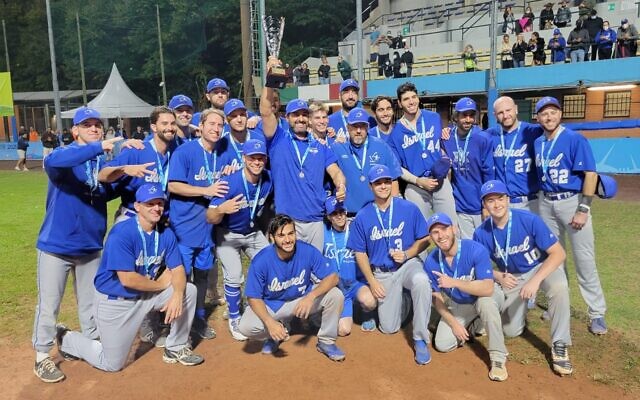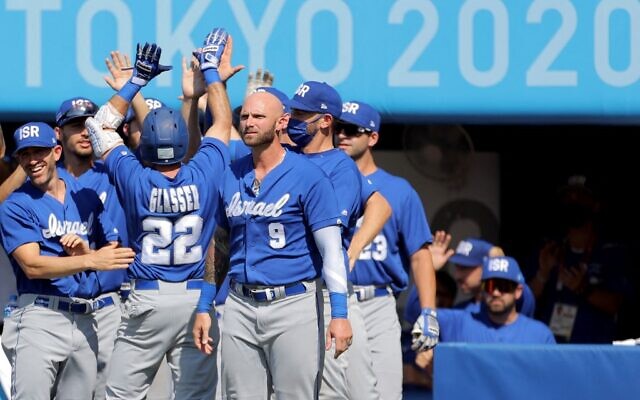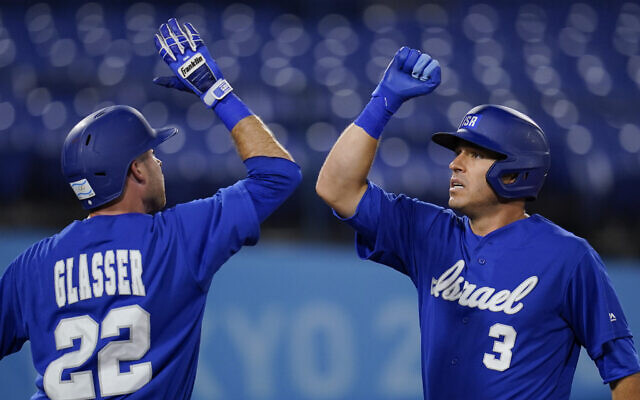JTA – The fifth edition of the World Baseball Classic kicked off on Wednesday and players and fans around the world are gearing up and roaring for two weeks of competition.
Jewish fans may remember this Israel took the WBC by storm in 2017winning four straight games as an underdog and advancing to the second round before being eliminated by Japan.
Team Israel is back for the 2023 WBC, with more current MLB talent on its roster than ever before. It will also face its toughest competition yet.
First held in 2006, the WBC is a quadrangular World Cup-style international tournament. Exploded in popularity in recent years, The COVID-19 pandemic led to the postponement of the event in 2021.
Israel’s manager and four-time MLB All-Star, Ian Kinsler, is feeling good about his team’s prospects. He played for Israel in the 2020 Olympics and won the WBC with Team USA in 2017.
“In baseball, anything can happen,” Kinsler told the Jewish Telegraphic Agency. “It’s not a series of five or seven games. It’s one game [at a time], And if we can put together a really solid game, solid nine innings against these other teams, then we have as good a chance as anybody. I know the players are fired up and ready to compete, so it’s going to be a lot of fun.”
Read on for a guide to who is playing a role in Team Israel, who the team will play, and how the tournament works.

The Israel national baseball team poses at the European Championships on Sept. 19, 2021. (Courtesy of the Israel Association of Baseball)
Who’s playing this year, and how did they qualify?
The 2023 WBC will feature 20 teams – up from 16 in 2017 – divided into four divisions (or pools) that will play in four venues: Tokyo, Phoenix, Miami and Taichung, a city of about 3 million in Taiwan.
Two teams from each of the four pools will advance to a single-elimination bracket including the quarterfinals, semifinals, and championship, all of which will be held in Miami. The first round runs from March 8 to March 15, with the elimination round immediately following. The championship game will be held on March 21.
Fans won’t be surprised to see countries like the United States, the Dominican Republic, and Venezuela on the list — those three account for roughly 90% of MLB players. But there are some less obvious countries that have qualified, including Israel.

Mitchell Glasser (3rd L, #22) of Israel is awarded the team award for his scoring during the seventh inning of the Tokyo 2020 Olympic Games Baseball Round 1 game between Israel and Mexico at Yokohama Baseball Stadium on August 1, 2021 in Yokohama, Japan Congratulations from colleagues. (Kazuhiro Fujihara/AFP)
Here are the four groups and where they will play in the first round.
- Pool A (Taichung): Chinese Taipei (Taiwan), Cuba, Italy, Netherlands, Panama
- Pool B (Tokyo): Australia, China, Czech Republic, Japan, South Korea
- Pool C: (Phoenix): Canada, Colombia, Great Britain, Mexico, United States
- Pool D (Miami): Dominican Republic, Israel, Nicaragua, Puerto Rico, Venezuela
The eligibility rules have changed several times over the years. For this year’s tournament, all 16 teams from 2017 qualified automatically, including Israel. The final four teams (Great Britain, the Czech Republic, Panama and Nicaragua) earned a spot through a 12-team, two-pool qualifying tournament in the final fall.

Ian Kinsler (3) of Israel celebrates with Michelle Glasser after hitting a home run in the third inning of a baseball game against South Korea at the 2020 Summer Olympics, Thursday, July 29, 2021, in Yokohama, Japan. (AP Photo/Sue Ogrocki)
Who’s on Team Israel?
Team Israel is arguably the best embodiment of the WBC’s unique eligibility rules. To play in the WBC, a player does not need to be born in the country or be an official citizen of the country he is playing for (as is the case in the Olympics). Simply being eligible for citizenship in a given country is sufficient.
Therefore anyone eligible for Israeli citizenship can play for Team Israel. Under Israel’s Law of Return, anyone with at least one Jewish grandparent is eligible for citizenship, as are the children and spouses of Jews.
In practice, these rules mean that Israel’s baseball team, at least in international competitions, has historically been composed mostly of American Jews. Native Israelis are still taking up the sport, which is far behind football and basketball in popularity. But Israel’s success on the international stage has helped raise the prestige of the sport.
The difference this time around is the wealth of professional talent on Team Israel’s roster. In fact, it boasts the most major league talent ever: Half of the roster has MLB experience.

Joc Pederson of the San Francisco Giants gathers himself between pitches during the first inning of a baseball game against the Pittsburgh Pirates on Friday, June 17, 2022, in Pittsburgh. (AP/Gene J. Pusker)
The best-known players on Israel’s roster are All-Star outfielder Jock Pederson, who hit 23 home runs and drove in 70 runs last year; American-Israeli pitcher Dean Kramer, who has a stellar 3.23 earned run average as the starting pitcher for the Baltimore Orioles in 2022; and veteran reliever Richard Blair, who had a 3.55 ERA last season for the Miami Marlins.
Big leaguers Jake Byrd (Colorado Rockies) and New York Yankees Scott Efros and Harrison Bader had planned to play for Israel but pulled out due to injuries. Outfielder Kevin Pillar was previously rumored to be on the team, but did not appear on the final roster. (Chicago White Sox ace Dylan Cease, whose father is Jewish, was also on the team’s initial list of potential players.)
Here is the full 30-man roster, along with their current playing levels – Triple-A is the top rung of the minor leagues, Single-A the lowest.
- starting pitcher: Brandon Gould (Triple-A), Colton Gordon (Single-A), Dean Kramer (Baltimore Orioles), Robert Stock (Triple-A)
- relief pitchers: Richard Blair (Boston Red Sox), Daniel Federman (Single-A), Jake Fishman (Triple-A), Andrew Gross (Double-A), Rob Kaminski (free agent), Alex Katz (free agent), Ivan Kravetz ( Double-A), Kyle Molnar (free agent), Bubby Rosman (free agent), Jakob Steinmetz (Arizona Diamondbacks organization), Joey Wagman (free agent), Zack Weinberger (Atlantic League), Zack Weiss (Los Angeles Angels), Josh wolf (single-a)
- outfieldersAlex Dickerson (Free Agent), Jacob Goldfarb (Free Agent), Spencer Horwitz (Triple-A), Joc Pederson (San Francisco Giants)
- Fielder: Jack Gelof (Triple-A), Ty Kelly (Free Agent), Noah Mendlinger (Single-A), Matt Mervis (Triple-A), Danny Valencia (retired from MLB), Michael Wilensky (Free Agent)
- Catchers: Ryan Lavernave (free agent), Garrett Stubbs (Philadelphia Phillies)

In this Tuesday, Jan. 14, 2020 photo, Danny Valencia throws a ball during Israel national baseball team practice in Tel Aviv (AP Photo/Ariel Shalit).
Teams may also add a reliever if they advance past the first round. For Israel, those additions are: Jake Kalish (Triple-A), Adam Kolarek (Los Angeles Dodgers organization), Jake Mednick (Single-A) and Israeli Shlomo Lipetz.
Israel’s big-league experience extends to his coaching staff as well. With Kinsler as manager, Israel will have former MLB and Team Israel manager Brad Ausmus and former All-Star Kevin Youkilis in the dugout, along with veteran coach Jerry Narron.
How has Israel fared in the past?
This WBC would be Israel’s second. Israel was not part of the 2006 or 2009 tournaments, and although it played in qualifying for 2013, it did not make the cut. Israel’s 2012 qualifying team included Ausmus as manager and a young Pedersen in the outfield.
In 2017, Israel entered the tournament as underdogs after winning the qualifying tournament in September 2016. ESPN called the team “the Jamaican bobsled team of the WBC”.
with their trust mensch on the bench mascotIsrael won its first four games, sweeping the first round, including a 2–1 victory over the host nation of South Korea. Israel also beat Chinese Taipei and the Netherlands, and they started the second round by defeating Cuba.
The proverbial Hanukkah oil seemed to be pouring out of there. Israel lost 12–2 to the Netherlands and 8–3 to Japan in the second round, ending their Cinderella run in sixth place at the tournament.
Catcher Ryan Lavernave earned Pool A MVP honors, and pitcher Josh Zaid was named to the All-WBC team following the tournament.
At the 2020 Tokyo Olympics, played in the summer of 2021 due to COVID-19, Israel finished fifth, defeating Mexico 12–5 in their lone win.
Who is Israel playing, and what should fans expect?
Israel is in Pool D, which has some of the best teams in the world.
Here is Israel’s WBC schedule (all times est.).
- Sunday, March 12 at 12 noon: Israel vs Nicaragua
- Monday, March 13 at 7 PM: Israel v Puerto Rico
- Tuesday, March 14 at 7 PM: Israel v Dominican Republic
- Wednesday, March 15 at 12 noon: Israel v Venezuela
Prior to the tournament, Israel played its share of two exhibition games against MLB teams. MLB’s effort to raise awareness for WBC, Israel faced the Miami Marlins on March 8 and the Washington Nationals on March 9; Late Nationals owner Ted Lerner was honored at the game.
After the WBC begins for Israel on March 12, the team will face several of Major League Baseball’s top players, including Francisco Lindor and Edwin Díaz for Puerto Rico; Ronald Acuna Jr. and José Altuve for Venezuela; and a truly stacked Dominican team that included Juan Soto, Manny Machado, Rafael Devers and National League Cy Young winner Sandy Alcantara.
On paper, Israel has outdone its competition. But as Kinsler points out, “At the end of the day, baseball comes down to execution.” And if 2017 is any indication, opponents should never count Team Israel out.
